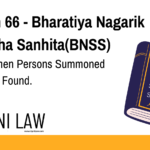Section 473 CrPC: Extension of Limitation Period in Criminal Cases
This section deals with the power of the court to extend the limitation period for filing a complaint or taking cognizance of an offense.
Explanation
Section 473 CrPC states that if a complaint or an information is filed within the period of limitation prescribed by law, but the court finds that the accused could not be brought to trial within that period due to circumstances beyond the control of the prosecution, the court can extend the period of limitation.
Illustration
Let’s say the limitation period for filing a complaint for theft is one year. The complainant files the complaint within one year, but due to some unforeseen circumstances, the accused is not available for trial. In this case, the court can extend the limitation period if it is satisfied that the delay was not due to the prosecution’s negligence.
Common Questions and Answers
Q: What are the circumstances beyond the control of the prosecution that can lead to an extension of the limitation period?
A: These include situations like the accused absconding, the prosecution facing difficulties in securing evidence, or any other circumstance that makes it impossible to bring the accused to trial within the limitation period.
Q: Who can apply for the extension of the limitation period?
A: The prosecution, or in some cases, the complainant, can apply to the court for an extension.
Q: What are the factors that the court considers while deciding whether to extend the limitation period?
A: The court considers the reasons for the delay, the conduct of the prosecution, the nature of the offense, and the prejudice caused to the accused due to the delay.
Q: Can the court extend the limitation period indefinitely?
A: No, the court can only extend the limitation period for a reasonable period, taking into account the specific circumstances of the case.






